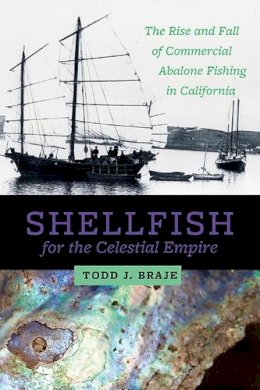
Stock image for illustration purposes only - book cover, edition or condition may vary.
Shellfish for the Celestial Empire
Todd J. Braje
€ 51.43
FREE Delivery in Ireland
Description for Shellfish for the Celestial Empire
Paperback. Uncovers the history and lifeways of Chinese immigrants working in the abalone industry on California s Channel Islands" Num Pages: 336 pages, 48 Illustrations, 9 maps. BIC Classification: 1KBBW; HDD; TVT. Category: (P) Professional & Vocational. Dimension: 229 x 152 x 18. Weight in Grams: 408.
In the 1800s, when California was captivated by gold fever, a small group of Chinese immigrants recognized the fortune to be made from the untapped resources along the Pacific coast, particularly from harvesting the black abalone of southern and Baja California. These immigrants, with skills from humble beginnings in a traditional Chinese fishing province, founded California’s commercial abalone industry and led its growth and expansion for several decades.
Today, the physical evidence of historical Chinese abalone fishing on the mainland has been erased by development. On California’s Channel Islands, however, remnants of temporary abalone collecting and processing camps lie scattered along the coastlines. These sites hold a treasure trove of information, stories, lifeways, and history. Todd Braje uses them to explore the history of Chinese abalone fishing, presenting a microcosm of the broader history of Chinese immigrants in America.
Today, the physical evidence of historical Chinese abalone fishing on the mainland has been erased by development. On California’s Channel Islands, however, remnants of temporary abalone collecting and processing camps lie scattered along the coastlines. These sites hold a treasure trove of information, stories, lifeways, and history. Todd Braje uses them to explore the history of Chinese abalone fishing, presenting a microcosm of the broader history of Chinese immigrants in America.
Product Details
Format
Paperback
Publication date
2016
Publisher
University of Utah Press,U.S. United States
Number of pages
336
Condition
New
Number of Pages
256
Place of Publication
Salt Lake City, United States
ISBN
9781607814962
SKU
V9781607814962
Shipping Time
Usually ships in 7 to 11 working days
Ref
99-1
About Todd J. Braje
Todd J. Braje is an associate professor of anthropology at San Diego State University, USA
Reviews for Shellfish for the Celestial Empire
“Although other authors have documented aspects of the rise and fall of commercial abalone fishing, to my knowledge none has the particular focus of Braje’s book: the social context of the industry and links to a deeper history. The book will have a significant impact in the fields of conservation of marine resources and marine habitat restoration.” —Michael A. Glassow, Professor Emeritus and Research Professor, University of California, Santa Barbara “A new and unique contribution to historical archaeology, the historical archaeologies of Chinese immigrants in the Americas, zooarchaeology, environmental archaeology, historical ecology, and western history. An innovative piece of work.” —Mark Warner, professor of anthropology and department chair, University of Idaho “This is archaeology with a purpose, committed not only to documenting the decline of an ecosystem, but also contributing to its restoration and to communicating this mission with wider academic and public audiences. This is a call to arms, addressing historical wrongs and mapping a sustainable future; it is fascinating, highly readable and recommended.” —Antiquity “An informative and enjoyable read for public and scientific audiences alike. Based on his research focused on the nineteenth-century commercial Chinese abalone fishing industry in California, Braje convincingly makes the argument that the deep time perspective historical ecology can provide should be embraced by marine ecologists, fisheries biologists, resource managers, and policy makers to help address modern ecological issues. … [The book] sends a powerful message about the immediate need for an interdisciplinary approach to our world’s most pressing ecological challenges.”—California Archaeology
